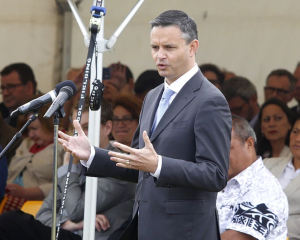The decision to call-in consent applications for controversial dairy farm developments is a victory for the Green Party and for every New Zealander who cares about water quality and the "wonderful" landscape and biodiversity of the Omarama and Ohau area, Green Party co-leader Russel Norman says.
Dr Norman, who was vocal in his opposition to what he described as "factory farming", said the companies who applied for the consents - Southdown Holdings Ltd, Five Rivers Ltd and Williamson Holdings Ltd - should abandon them now.
"The huge public opposition shows that these proposals are a step too far."
During a visit to the area last week, he spoke to many people, including farmers, salmon farmers and tourism operators and the level of opposition was "very, very widespread".
The soils were incredibly thin and rocky and, with the prospect of as much as 1.7 million litres of diluted effluent being put on the land every day, there was "no question" it would filter through into the groundwater and either end up in the aquifers or lakes and rivers.
"We need a comprehensive plan for the future of this precious area, rather than a series of ad hoc applications which will see it slowly destroyed piece by piece," Dr Norman said.
He believed Environment Minister Nick Smith should develop a national policy statement for the area because its biodiversity, landscape and water quality were of national significance.
He was disappointed the board of inquiry would not consider the animal welfare concerns associated with the consents, saying there clearly needed to be a more robust process for dealing with animal welfare concerns arising from resource consent applications.
He was still concerned that land-use consents associated with the proposed farms were issued by the Waitaki District Council without being publicly notified and he would continue to pursue that issue.
Waitaki First chairwoman Helen Brookes said establishing a board of inquiry was the "only way to go".
The issues were complex and going to arise in other parts of New Zealand.
Decisions relating to the appropriateness of managing farm animals indoors for considerable lengths of time needed to be dealt with to set a benchmark for future applications, Dr Brookes said.
North Otago Federated Farmers high country representative Simon Williamson, who farms at Omarama, said it was a positive move.
The applications were holding up other farmers in the district that needed water for mixed farming to ensure profitability.
Twizel resident Scott Aronsen, who was involved with organising a public meeting in Twizel last month to debate the issue, said it was good that politicians had taken notice of what people were saying.
"We'll be seeking some legal advice to see where we should go from here," he said.
Environment Canterbury chairman Alec Neill was pleased a decision had been made by Dr Smith as there had been "substantial pressure" on the regional council from other political organisations to demand the applications be called-in.
The minister's decision would hopefully resolve concerns raised by political organisations in New Zealand and overseas.
ECan had been working with Dr Smith over the past two weeks looking at the legal aspects of a call-in and the requirements of the Resource Management Act in relation to animal welfare issues.
ECan was not taking a negative view of Dr Smith's call-in of the consents.
The minister had made it clear in interviews with media that he had been working closely with ECan and there was no criticism of the way the regional council had handled the applications, Mr Neill said.











